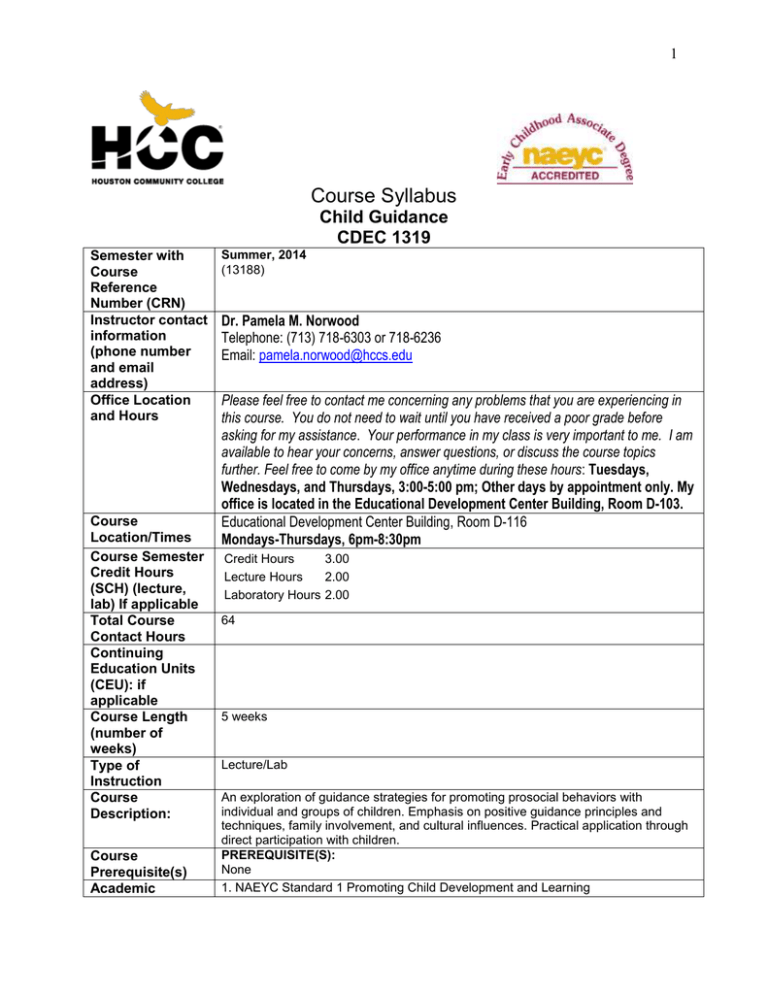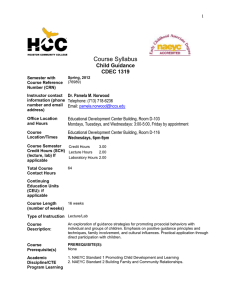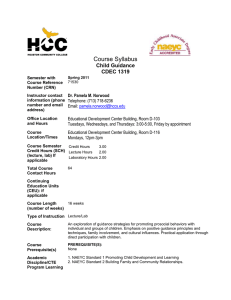CDEC 1319 New Syllabus Format Summer 2014.doc
advertisement

1 Course Syllabus Child Guidance CDEC 1319 Semester with Course Reference Number (CRN) Instructor contact information (phone number and email address) Office Location and Hours Course Location/Times Course Semester Credit Hours (SCH) (lecture, lab) If applicable Total Course Contact Hours Continuing Education Units (CEU): if applicable Course Length (number of weeks) Type of Instruction Course Description: Course Prerequisite(s) Academic Summer, 2014 (13188) Dr. Pamela M. Norwood Telephone: (713) 718-6303 or 718-6236 Email: pamela.norwood@hccs.edu Please feel free to contact me concerning any problems that you are experiencing in this course. You do not need to wait until you have received a poor grade before asking for my assistance. Your performance in my class is very important to me. I am available to hear your concerns, answer questions, or discuss the course topics further. Feel free to come by my office anytime during these hours: Tuesdays, Wednesdays, and Thursdays, 3:00-5:00 pm; Other days by appointment only. My office is located in the Educational Development Center Building, Room D-103. Educational Development Center Building, Room D-116 Mondays-Thursdays, 6pm-8:30pm Credit Hours 3.00 Lecture Hours 2.00 Laboratory Hours 2.00 64 5 weeks Lecture/Lab An exploration of guidance strategies for promoting prosocial behaviors with individual and groups of children. Emphasis on positive guidance principles and techniques, family involvement, and cultural influences. Practical application through direct participation with children. PREREQUISITE(S): None 1. NAEYC Standard 1 Promoting Child Development and Learning 2 Discipline/CTE Program Learning Outcomes Course Student Learning Outcomes (SLO): 4 to 7 Learning Objectives (Numbering system should be linked to SLO e.g., 1.1, 1.2, 1.3, etc.) SCANS and/or Core Curriculum Competencies: If applicable 2. NAEYC Standard 2 Building Family and Community Relationships. 1. Summarize theories related to child guidance. 2. Explain how appropriate guidance promotes autonomy, self-discipline, and lifelong social skills in children. 3. Recognize the impact and influence of families and culture in guiding children. 4. Promote development of positive self-concept and pro-social behaviors in children. 5. Apply appropriate guidance techniques to specific situations relating to children's behaviors. 6. Demonstrate skills in helping children resolve conflicts. Summarize theories related to child guidance. 1. Outline a variety of guidance techniques to use with different age children based on developmental needs and abilities. Explain how appropriate guidance promotes autonomy, self-discipline, and life-long social skills in children. 1. Describe development of self-concept and self-esteem. 2. Explain the role of indirect guidance techniques in classroom management. Recognize the impact and influence of families and culture in guiding children. 1. Describe how cultural differences affect guidance. 2. Describe the importance of working with parents to solve guidance issues. Promote development of positive self-concept and pro-social behaviors in children. 1. Demonstrate techniques teachers can use to facilitate positive social interactions among children. Apply appropriate guidance techniques to specific situations relating to children's behaviors. 1. Recognize true problem behaviors and identify professional resources for specific developmental or family needs. 2. Demonstrate skills in classroom management and guidance techniques as they relate to common problems behaviors (e.g., biting, hitting, tantrums, inappropriate language, high activity level, etc.) Demonstrate skills in helping children resolve conflicts. 1. Implement principles of conflict resolution. 2. Demonstrate teamwork skills when guiding children SCANS Summarize theories related to child guidance. Foundation Skills - Thinking -Knowing How to Learn Explain how appropriate guidance promotes autonomy, self-discipline, and life-long social skills in children. Foundation Skills - Thinking -Reasoning Recognize the impact and influence of families and culture in guiding children. Foundation Skills - Thinking -Seeing Things in the Mind's Eye Promote development of positive self-concept and pro-social behaviors in children. Workplace Competencies - Information -Interprets & Communicates Apply appropriate guidance techniques to specific situations relating to children's behaviors. Workplace Competencies - Information -Organizes & Maintains Demonstrate skills in helping children resolve conflicts. Workplace Competencies - Information -Interprets & Communicates 3 Course Calendar Week/Dates Topic *Week 1 Session 1/ Mon-June 2 Introductions, Course Content, Text Overview & Requirements Why Guidance Matters Session 2/ Tues-June 3 Session 3/ Wed-June 4 Required Readings and Assignment Due Chapter 1 Historical Perspectives and Guidance Theories Understanding Children’s Behavior Chapter 2 *Week 2 Session 5/ Mon-June 9 How to Observe Children Chapter 4 Session 6/ Tues-June 10 Fundamental Causes of Positive and Negative Behavior Preparation for the Case Study Project Chapter 9 Artifact Due-Bring one of your selected behavior articles for a summary and response exercise Session 8/ Thurs-June 12 Serving Culturally Diverse Children and Families Chapter 5 ON-LINE SESSION *Week 3 Session 9/ Mon-June 16 Behavior Research Presentations Assignment #1- Behavior Research Reports DUE (100 pts) Session 10/ Tues-June 17 Session 11/ Wed-June 18 Exam #1 Review Chapters 1-5, 9 (100 pts) Chapter 7 Session 4/ Thurs-June 5 Session 7/ Wed-June 11 Session 12/ Thurs-June 19 *Week 4 Session 13/ Mon-June 23 Designing Developmentally Appropriate Environments Inside/Out Building Relationships through Positive Communication Effective Guidance Interventions Session 14/ Tues-June 24 Teaching ProSocial Skills and Behaviors Session 15/ Wed-June 25 Teaching Conflict Resolution Skills Chapter 3 Chapter 8 Chapter 10 Assignment #2-Behavior Intervention Plans DUE (100 points) 4 Instructional Methods Required Component Student Assignments Student Assessment(s) Instructor's Requirements Week/Dates Topic Required Readings and Assignment Due Session 16/ Thurs-June 26 Understanding Children with Ability Differences Chapter 6 ON-LINE SESSION *Week 5 Session 17/ Mon-June 30 Mistaken Goals, Motivation, and Mindfulness Chapter 11 Assignment #3-Program Observation Reports DUE (100 points) Session 18/ Tues-July 1 Teaching Prosocial Behaviors and Social Skills II Group A Assignment #4-Microteaching Lesson Plans DUE (100 pts) Session 19/ Wed-July 2 Teaching Prosocial Behaviors and Social Skills II Group B Assignment #4-Microteaching Lesson Plans DUE (100 pts) Session 20/ Thurs-July 3 Exam #2 Review Chapters 6-8, 10-11, and Handouts distributed (100 pts) Face to Face Web-enhanced (49% or less) This course includes at least one of the following required components: practicum assignment, key assessment, field experience hours, and/or First Aid/CPR certification. If this assignment is not completed with 70% of possible points, you will not receive a passing grade in this class. Your instructor will explain the required components identified for this course-practicum assignment and behavioral case study. Program Observation Lab, Problem Behavior Research Project, Microteaching/Prosocial Lesson Plan, Behavioral Case Study, Practicum Reflection Two (2) major exams (consisting of multiple choice, true/false, and short answer questions); online weekly quizzes based on reading assignments, and the student assignments noted above. IR 1. Extra Credit-Students who are not absent more than twice will eligible for 25 extra credit points that will be applied towards the final grade. They will also be able to submit one (1) additional extra credit assignment from a list that is provided on the Assignment Descriptions handout. IR 2. Late Assignments-Course assignments will be considered LATE if they are not received by Friday of the week during which the assignment is due. Five (5) points per class session will be taken off the original grade of each assignment that is turned in beyond but within two weeks of the due date. After two weeks, these assignments may still be accepted but the final grade will be reduced by 20% as a penalty. No LATE ASSIGNMENTS will be accepted during the week of finals. IR 3. Use of Electronic Devices-Although admittedly convenient, most modern technological devices are considered inappropriate and distracting in the classroom. The use of cell phones, pagers, beepers, and/or palm pilots is severely discouraged in this class. If you must carry one of these devices, make sure you turn it OFF or on VIBRATE before arriving to class. Please refrain from answering or responding to any 5 calls, text messages, or other means of communication inside the classroom. Leaving the class to respond to such a call should be done only in the case of a verifiable emergency. Repeated violations of this policy will result in you being asked to leave the class session or withdraw from the course. IR 4. Make-Ups-All students who have a documented, college- approved excuse for missing an assignment may make up the assignment without any grade reduction or penalty. Approved excuses include personal illness, a death in the immediate family, and participation in official college functions. Students who are unable to attend during an examination day should contact the instructor as soon as possible to reschedule. Make-up examinations must be completed in the instructor’s office or other designated location within TWO WEEKS of the original date of the exam. Please note that failure to take the collaborative exam(s) on the date scheduled will result in the student having to take the examination on an individual basis! IR 5. Monitoring of Student Progress-It is highly recommended that you keep backup copies of all of your submitted work and that you keep all of your graded assignments until the final grades are posted. Program/Discipli ne Requirements: If applicable HCC Grading Scale Instructor Grading Criteria NOTICE This course of study would not be appropriate for anyone who falls into the following category as noted by the Texas Department of Family and Protective Services. "No person with a conviction or who is under indictment for, or is the subject of an official criminal complaint alleging violation of any of the crimes listed as a felony against the person or felony violation of the Texas Controlled Substance Act may be present while children are in care." ORIENTATION Students who are completing lab, practicum, or field experience components at the Houston Community College Child Development Lab School must complete a mandatory Orientation to the Department of Early Childhood Studies. Contact the department at (713) 718-6303 for more details about the orientation. A = 100- 90 4 points per semester hour B = 89 - 80: 3 points per semester hour C = 79 - 70: 2 points per semester hour D = 69 - 60: 1 point per semester hour 59 and below = F 0 points per semester hour IP (In Progress) 0 points per semester hour W(Withdrawn) 0 points per semester hour I (Incomplete) 0 points per semester hour AUD (Audit) 0 points per semester hour IP (In Progress) is given only in certain developmental courses. The student must reenroll to receive credit. COM (Completed) is given in non-credit and continuing education courses. To compute grade point average (GPA), divide the total grade points by the total number of semester hours attempted. The grades "IP," "COM" and "I" do not affect GPA. See "Health Science Program/Discipline Requirements" for grading scale. 800 points total possible A=720-800 D=480-559 B=640-719 F=479 or below C=560-639 6 Miller, D.F. (2013). Positive Child Guidance (7th ed.). Albany, New York: Cengage Instructional Learning. Materials HCC Policy Statements: http://www.hccs.edu/district/about-us/policies/d-student-services/ Access Student Services Policies on their Web site: Distance Education and/or Continuing Education Policies http://de.hccs.edu/ Access DE Policies on their Web site: http://www.hccs.edu/continuing-education/ Access CE Policies on their Web site:



